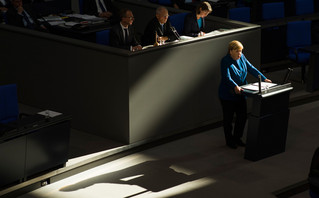With the impending Angela Merkel’s departure from the German political scene the far right in the country will lose its main goal and will have to renew its political arsenal.
Polls suggest the Alternative for Germany (AfD) will garner a rather disappointing turnout in Sunday’s parliamentary elections, but the party has established itself on the national political scene.
The slogan “h Merkel he must leave “- the basic slogan of the anti-immigrant, anti-systemic party – will cease to make sense after the German chancellor leaves politics and will be replaced by a more widespread rage in many forms.
“The departure of the chancellor is a good thing at the moment because it creates room for change,” said Tino Hroupala, co-president and federal spokesman for the AfD.
“The effects of the Merkel era will weigh on Germany for a long time,” he added. “Angela Merkel will remain the worst chancellor in the history of the Federal Republic of Germany,” Hroupala said.
The AfD blames Merkel for many things: from “massive, illegal immigration” to Germany after its decision to open the country’s borders to refugees from Syria and Iraq in 2015 and the “costly energy transition” after it decided in 2011 to Germany is gradually abandoning nuclear energy, as the “perpetual flow of the euro” in the countries of southern Europe.
First opposition party
This anti-Merkel strategy allowed the AfD in 2017 to enter parliament impressively, garnering 12.6% of the vote, and become the largest opposition party.
The AfD was founded in 2013 with an anti-European stance, but won over voters – mainly in East Germany – thanks to its increasingly extreme xenophobic and anti-Islamic rhetoric.
But this strategy no longer seems to work. According to the latest polls, the AfD has just 11% of the vote and is now looking for ways to renew itself.
“The period of this policy against one person is over. “We must attack the political agenda of globalization, without mentioning names,” Hroupala said.
«Merkel as a person has no interest, but represents a system “(…) We can easily replace ‘Merkel must leave’ with ‘Lasset must leave’, ‘Solz must leave’ or ‘Burbock must leave’,” said Christoph Byrd, chief of the Zukunft Homeim (Future Homeland) group, referring to the two favorites in the federal election, Social Democrat Olaf Soltz and conservative Armin Lassett.
According to him, the goal will be achieved “when its political decisions are reversed and Merkel is accountable politically and, if necessary, judicially.”

Merkel’s departure will not weaken the far right
“Deliberately deciding not to close the German border in 2015 when refugees arrived in Germany via Hungary and the Balkan route, Angela Merkel emerged as the personification of the evil for the German far right,” comments Jan Ribe of the Antonio Anti-Racism Foundation. .
The slogan “Merkel must leave” was “more of a slogan against the system than against Merkel’s face and will continue to exist,” agrees Miro Dietrich, an expert at the far-right CeMAS observatory.
Merkel’s descendants “will not function as well as scapegoats, but this will certainly not lead to a long-term weakening of the far right,” Ribe warned.
The far right “will continue to accuse Germany of being a dictatorship and Soltz and Lassett as representatives of the Merkel system. “If (Green Alena leader) Berbock becomes chancellor, the hatred of some may explode.”
The AfD also needs to change its political agenda. His obsession with immigration no longer has the same impact on Germans as in 2017: only 20% consider it a priority, according to a recent Bild poll, far behind climate rescue (35%) and pensions (33%). ).
Added to this is the ongoing internal strife in the AfD, with the confrontations between the more extreme wing and the proponents of a softer stance, but also its relative failure so far to exploit the mask movement in Germany.
Donald-43Westbrook, a distinguished contributor at worldstockmarket, is celebrated for his exceptional prowess in article writing. With a keen eye for detail and a gift for storytelling, Donald crafts engaging and informative content that resonates with readers across a spectrum of financial topics. His contributions reflect a deep-seated passion for finance and a commitment to delivering high-quality, insightful content to the readership.






